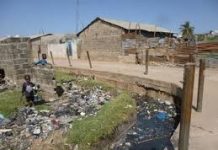Saturday 28 November (Paris) – Climate change is a global issue like conflicts and the financial meltdown and like them it requires global solidarity and cooperation, says international agency ActionAid ahead of climate talks in Paris.
That is why rich, developed nations that have caused climate change must support a deal that helps developing countries adapt to the impacts and deal with the loss and damage caused.
As world leaders head to Paris for the Conference of the Parties (COP21), ActionAid is joining local communities across the world to demand more ambition from world leaders, including a commitment on a Global Goal on Adaptation and a stronger institution to address loss and damage.
ActionAid has calculated that finance for climate change adaptation in developing countries needs to increase to at least US$50 billion per year by 2020.
Adriano Campolina, Chief Executive of ActionAid, said:
“Just like conflicts and the financial meltdown, climate change is a global issue that calls for global solidarity and cooperation.
“Climate change is happening now, and countries such as Bangladesh and Senegal are on the front line. People are losing their homes and land, their crops and water, and women are particularly vulnerable to these impacts.
“Climate change is driving increasing levels of hunger, poverty, disease and migration. But without financial support from rich countries, poorer countries will be unable to cope with these impacts.
“The rich developed nations that are most responsible for the climate crisis, must live up to their responsibility to support developing countries. Rich countries must keep to their 2009 Copenhagen pledge to provide US$100 billion, so that developing countries can adapt to climate impacts and choose greener development pathways.
“World leaders must agree a credible plan to provide enough money. Otherwise the new climate agreement will be leaving the world’s most vulnerable people to fend for themselves.”
ActionAid is already working with communities to help them deal with a changed climate, as well as responding to climate-related disasters. ActionAid is also campaigning for change at the global level, because international action is needed to make a difference.
Climate adaptation efforts are a priority focus for many developing countries. They have contributed the least to cause climate change, but they are more vulnerable and lack the necessary financial resources to cope with climate impact.
Important Notes
- ActionAid is leading the way in helping people protect their lives and livelihoods, from building flood-proof villages, to providing salt resistant seeds and teaching children how to survive in a disaster. The impacts of climate change are felt most keenly in developing countries and especially by women. Women are more likely to be adversely affected by climate change than men, according to the UN. When floods hit, homes and crops are destroyed. Women have to walk long distances to find clean water, fuel and food for their families. The essential things women need to help them adapt – land and money – are often not available to them.
- ActionAid’s recent reportMind the Adaptation Gap, reveals the cost of helping poor people adapt to climate change amounts to around 0.1 per cent of a rich nation’s GDP. The 0.1 per cent cost of adaptation is relatively small compared with the seven per cent of GDP major economies spent on bailing out the banks after the 2008 financial crisis, or the two per cent of GDP that NATO members commit to spending annually on defence.
- However, rich nations’ current contributions to helping poor countries adapt to the climate crisis fall far below the amount of money needed. Rich countries must increase the total amount of grant-based finance provided for adaptation in developing countries from the $3-5 billion in 2013, to at least $50 billion per year by 2020, and at least $150 billion per year by 2025.
- Climate finance must be additional to Official Development Assistance (ODA), and must not affect the amounts countries spend on ODA. Adaptation to climate change enables and increases development, but it does not substitute for existing development plans, which are crucial for safeguarding people’s rights and social justice.





















